Meet the Transition to Leadership Awardees
Patient-Oriented Research Awards – Transition to Leadership Stream
The Patient-Oriented Research (POR) Awards – Transition to Leadership Stream (TLS) is a funding component of the SPOR Capacity Development Initiative. The award supports the career launch of the next generation of patient-oriented researchers and their continued development through supportive connections with leaders of the POR community. It also includes some awards for researchers specifically contributing to Indigenous health research.
POR Award-TLS Awardees
| Profile: |
|---|
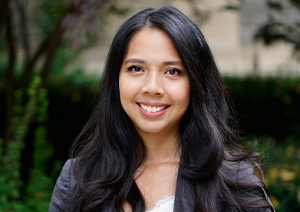 Mary AglipayProject Title: Determining Covid -19 Disease Burden and the Effectiveness of Public Health Measures in Children About you and your Fellowship Program of Work: I am a 1st-year PhD student in Epidemiology at the University of Toronto. My current research is on leveraging machine learning tools and patient-oriented methods to examine the burden of disease of Covid-19 in children and the effectiveness of Covid-19 public health measures. Becoming a Patient-Oriented Researcher: My graduate work will use machine learning to harness the power of complex datasets. These algorithms can widen existing health disparities, but they can also be used proactively to advance health equity. I will work with the Patient and Clinician Team of TARGet Kids!, the largest primary care research network for children in Canada, to incorporate fairness into the design, deployment, and evaluation of machine-learning models. Relevant Links:
|
 Brooke AllemangProject Title: The READY2Exit Study: Readiness and Experiences of Adolescents and Young Adults with Co-occurring Physical and Mental Health Issues Exiting Pediatric Services About you and your Fellowship Program of Work: I am a clinical social worker and passionate advocate for partnering with youth in health research. This is exemplified in my fellowship project, which uses a youth-engaged, mixed methods design to understand the needs of youth with co-occurring physical and mental health issues exiting pediatric services. Becoming a Patient-Oriented Researcher: I aspire to advance the science and practice of youth-engaged health research in Canada. To this aim, I am developing expertise in meaningfully engaging youth throughout the research process. I am collaborating with multidisciplinary teams, partnering with youth patients in research, leading a provincial youth advisory council and consistently engaging in training initiatives through SPOR. These opportunities support my growth as an emerging leader in POR by expanding my perspectives, critical thinking skills and network. Relevant Links:
|
 Kristelle Alunni-MenichiniProject Title: Integrating people with experiential knowledge in collaborative approaches: How to support their participation About you and your Fellowship Program of Work: I hope to develop inclusive, collaborative research projects for people struggling with complex addiction problems. Thanks to this fellowship, I can identify the conditions required for success and the challenges associated with integrating people with complex addiction issues in the context of collaborative approaches. Becoming a Patient-Oriented Researcher: We need to better integrate people with first-hand experience into the projects that affect them. I hope to improve my ability to integrate people struggling with complex health issues, particularly the most vulnerable, into research projects, collaborative approaches and public policies. This concern will certainly be a through line in my future research projects, and this fellowship will help me achieve this goal. Relevant Links:
|
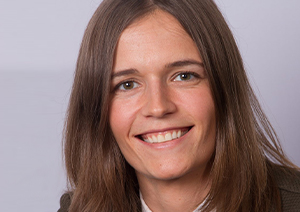 Anna ChudykProject Title: Building capacity for patient-oriented research within a Canadian research hospital About you and your Fellowship Program of Work: My postdoctoral fellowship focuses on developing the theory underlying POR and applying these learnings to clinical research in older adults. My current projects include a review of models/frameworks of patient engagement, mixed-methods study of SPOR-funded research, and expanding enhanced recovery protocols for cardiac surgery to include patient and caregiver perspectives. Becoming a Patient-Oriented Researcher: I applied to this program to support my transition into a career as an independent patient-oriented clinical researcher. My steps towards becoming a POR leader include (a) developing expertise in key POR knowledge areas, (b) applying this expertise to developing a clinical POR program and system/culture that enhances capacity for POR at my research hospital, and (c) developing meaningful working relationships with diverse groups of patient partners and academic researchers within our POR community. Relevant Links: |
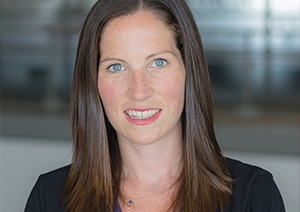 Andrea CrossProject Title: Family Engagement in Research: Evaluation, sustainability, and scalability of an online training program for family and research partners in child health research About you and your Fellowship Program of Work: I am a post-doctoral fellow in the Department of Pediatrics and School of Rehabilitation Science at McMaster University. My research is exploring the sustainability, scalability, and long-term impacts of an online course in family engagement in research. The FER Course has been developed and delivered in partnership with parents and researchers. Becoming a Patient-Oriented Researcher: Patient-Oriented Research (POR) has always been foundational to my research program. As a POR Fellow, I am excited for the opportunities provided by my supervisory committee, the program, and the National Training Entity for professional development and mentorship in POR. These training opportunities will further my knowledge and skills in patient engagement, partnership development, knowledge mobilization, and help me to establish and cultivate interdisciplinary networks in POR and work towards becoming a leader in POR. Relevant Links:
|
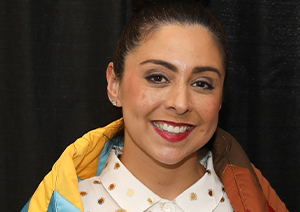 Amanda Fowler-WoodsProject Title: Identity as Visibility: perspectives and experiences of Indigenous peoples in Manitoba with racial, ethnic, and Indigenous identifier data collection within healthcare. About you and your Fellowship Program of Work: As a First Nations researcher, Indigenous epistemology, ontology, axiology and methodology shapes and guides my research practice, as well as all aspects of my life. Central to my dissertation study is to move towards the reclamation and recontextualizing of the meaning of Indigenous identity; an act of resistance by disrupting ongoing silencing and marginalization of Indigenous peoples within the healthcare system. Becoming a Patient-Oriented Researcher: As a lead in the partnership between Ongomiizwin Indigenous Institute of Health and Healing and the George and Fay Yee Centre for Healthcare Innovation – the Manitoba SPOR, I am supported through numerous opportunities for building and strengthening my position as a leader in POR. This role involves membership on numerous leadership committees, boards, projects, and teams. Highlights include being a Co-PI on the successful application for the next 5-years of funding for the Manitoba SPOR. Contributions to Indigenous Health Research Landscape: Throughout my 11-year career as a First Nations researcher (University of Manitoba) and through my dissertation research, I am committed to carrying out research that honours the historical and contemporary realities of Indigenous peoples in Canada and strongly advocates for the use of principles of respectful research with Indigenous peoples. |
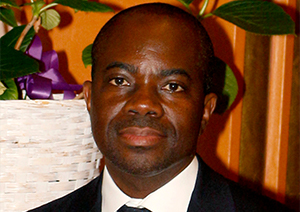 Amédé GogovorProject Title: Patient-engaged development of standards for a reporting guideline for scaling studies of health interventions About you and your Fellowship Program of Work: I am a postdoctoral fellow in health services research and knowledge mobilisation, leading the development of reporting standards for scaling studies, a project that integrates the principles of patient-oriented research. My research interests include patient experience, drug utilization, sex/gender and intersectional analysis to improve health outcomes and equity, and meta-research. Becoming a Patient-Oriented Researcher: There is growing recognition that patient and public engagement produces better research and health outcomes. My interest in patient-oriented research stems from my involvement in the design, implementation, and dissemination of results from serial Health Care in Canada surveys of the Canadian public and health professionals and my doctoral work on patient-centred care/patient experience. This fellowship program aligns well with my goals as an independent researcher, using patient and community engagement approaches as a means toward health equity. Relevant Links: |
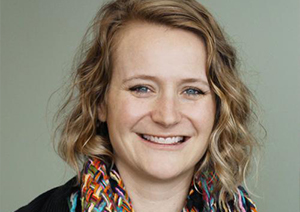 Tanya HalsallProject Title: A developmental evaluation that applies a youth-driven approach to examine the implementation of the Icelandic Model for Primary Prevention of Substance Use within a Canadian community About you and your Fellowship Program of Work: I apply participatory strategies to partner with young people to co-design research strategies and community-based initiatives to promote mental health. For my fellowship program of work, I am leading a study designed to examine the implementation of the Icelandic Prevention Model in a rural community in Ontario. Becoming a Patient-Oriented Researcher: I applied to this program so that I can continue to learn how to integrate youth voices within initiatives that take an ecological approach to mental health promotion. Through this work, I have continued to deepen my relationships with key youth advocates, and I have developed new partnerships with policy-makers, academics and organizations working at the system-level. This research is establishing new knowledge with respect to best practices in youth engagement within health promotion. Relevant Links:
|
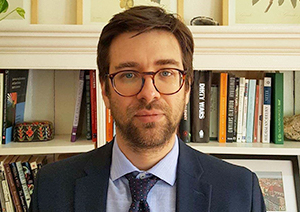 Gerald JordanProject Title: Where do I belong? A participatory, mixed methods study examining citizenship among youth experiencing the onset of a mental illness About you and your Fellowship Program of Work: My Postdoctoral program of research examines how youth transform their lives and communities following a serious mental health challenge like psychosis, and how such transformations are shaped by social and community-level determinants of health and resilience, such as community-based mental health services. My goals are to conduct research that supports equitable and inclusive communities for people experiencing mental health difficulties, and to help show that people with mental illness are not a burden on society. Becoming a Patient-Oriented Researcher: I strongly believe that research should be conducted in full partnership with people impacted by what is being researched. Doing so helps ensure that our research matters, our methods are appropriate and conducted ethically, and our results more closely correspond to the everyday lived reality of people who suffer. I also seek to support the professional and intellectual development of my co-researchers so they can eventually become leaders in a domain of their choosing—which is something I find very rewarding. Relevant Links:
|
 Michelle KnoxProject Title: Examining Ethical and Equitable Access to Medical Assistance in Dying: Attitudes, Behaviours, and Experiences Relating to Service Utilization About you and your Fellowship Program of Work: I am a PhD student in medicine and my doctorate explores the social dimensions of Medical Assistance in Dying and terminal patients’ health access experiences. My fellowship goals include the evaluation and application of interdisciplinary methods to involve stakeholders in improving palliative (and other) healthcare services. Becoming a Patient-Oriented Researcher: I applied for this fellowship because it was an opportunity to converge my wide-ranging interests through the lens of patient-oriented research. My professional development activities involve, among others, developing and testing patient engagement tools for participatory health projects at the Design x Health Research Innovation Lab (University of Alberta). Through this fellowship, I hope to develop a program leveraging my interdisciplinary background and diverse methodological experience to foster new collaborative practices for health systems innovation. Relevant Links:
|
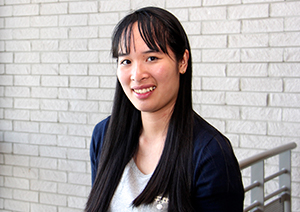 Linda NguyenProject Title: Exploring sibling relationships of adolescents with disabilities during health care transition About you and your Fellowship Program of Work: I am currently a PhD Candidate in the School of Rehabilitation Science and CanChild Centre for Childhood Disability Research at McMaster University. My doctoral studies are focused on understanding the experiences of siblings of youth with a disability during the transition to adulthood, including the transition to adult health care. Becoming a Patient-Oriented Researcher: To become a leader in patient-oriented research, I strive to continue:
Relevant Links: |
 Sophie RoherProject Title: Collaboration or domination? Indigenous patients’ and biomedical healthcare providers’ understandings and experiences with Indigenous wellness services and Indigenous healing practices at Stanton Territorial Hospital in Yellowknife, Northwest Territories About you and your Fellowship Program of Work: My fellowship program of work builds on a project I conducted with the Stanton Territorial Hospital Elders’ Council in Yellowknife, Northwest Territories. It examines how Indigenous patients and biomedical healthcare providers understand and experience the Indigenous wellness services and Indigenous healing practices at Stanton Territorial Hospital, and seeks to enhance the delivery of culturally safe hospital care for Indigenous patients. Becoming a Patient-Oriented Researcher: I am passionate about community-based research approaches and knowledge translation and have over 7 years of experience working with Indigenous Elders and community partners on research projects that aim to improve the health and wellness of Indigenous populations. I believe that meaningful collaboration and partnerships are instrumental to conducting relevant, ethical, and beneficial patient-oriented research, particularly with Indigenous and northern communities. Contributions to Indigenous Health Research Landscape: My program of work was co-created with Indigenous Elders and community members and overseen by a local Indigenous Community Advisory Committee. It has also been guided by Two-Eyed Seeing, a Mi’kmaq guiding principle that recognizes that there are multiple ways of seeing the world. My research uses methods that purposefully foreground Indigenous worldviews, encourage dialogue between Indigenous and non-Indigenous perspectives and creates space for Indigenous and non-Indigenous knowledge sharing. |
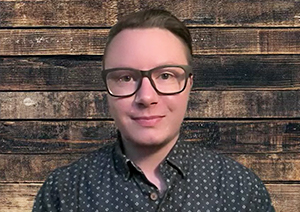 Leo RutherfordProject Title: Patient Reported Outcomes of Genital Reconstruction and Experiences of Surgical Satisfaction (PROGRESS) About you and your Fellowship Program of Work: I am a PhD candidate at the University of Victoria, on the territory of the lək̓ʷəŋən peoples. My work focuses on transgender health and gender-affirming care. My dissertation project, created with trans community members, looks at outcomes of gender-affirming genital surgeries and is creating invaluable community knowledge. Becoming a Patient-Oriented Researcher: I values and am passionate about robust inclusion of patients and community members in research that effects their lives. Becoming a leader in patient-oriented research is an integral step in actualizing this value and working towards meaningful change for patients. In my work, I hope to continue research that centers trans and non-binary patients in research about their surgical care. This fellowship has made a significant difference in my ability to achieve this goal. Relevant Links:
|
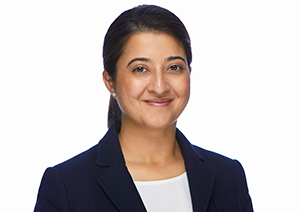 Ambreen SayaniProject Title: Improving access to lung cancer screening in the underserved, and building capacity for future cancer patient oriented research in Canada. About you and your Fellowship Program of Work: As a social scientist (PhD in health policy and equity) with a clinical background (MD with training in surgical oncology) my work is situated at the interface between social and health equity, and subsequent implications for cancer risk, treatment and survival. My overarching research goal is to advance interdisciplinary research focused on reducing inequities in cancer care. Becoming a Patient-Oriented Researcher: I am driven by a desire to integrate patient values and perspectives into clinical care as I believe patient-identified priorities can inform meaningful research, provide practical evidence and create equitable health systems. The TLS-POR award has provided the opportunity to further develop my skills in Equity, Diversity and Inclusion (EDI), partner with structurally seldom-heard community members and co-design an innovative and scalable model of equitable patient engagement called Equity-Mobilizing Partnerships in Community (EMPaCT). Relevant Links: |
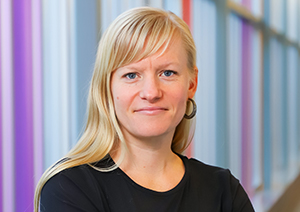 Laura SchummersProject Title: A Patient-Oriented Approach to Examining the Effect of Canada’s Unique Medical Abortion Drug Policy on Patient Abortion Access and Outcomes About you and your Fellowship Program of Work: I conduct epidemiologic and health policy research to improve reproductive population health. I collaborate closely with clinicians, policy-makers, and patients to analyze linked population-based data. My fellowship research examines the impact of Canada’s uniquely unrestricted regulatory approach to the medical abortion drug mifepristone on patient abortion access and health outcomes. Becoming a Patient-Oriented Researcher: This program provides an ideal opportunity to expand my knowledge of patient-oriented research, patient engagement, and knowledge translation with patients. Becoming a leader in patient-oriented research will enable me to engage patients and multisectoral stakeholders in all phases of my research. This approach is not often included in graduate training in epidemiology, but is crucially important to frame health research around the needs and priorities of those served by health care – patients. Relevant Links: |
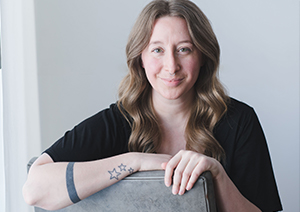 Linzi WilliamsonProject Title: The Role of Stigma for Veterans with Posttraumatic Stress Disorder working with Service Dogs About you and your Fellowship Program of Work: I am a Postdoctoral Fellow in the Department of Sociology at the University of Saskatchewan and Credentialed Evaluator. My research focuses on the experiences of stigma for Canadian Veterans working with Service Dogs, with the goal of improving the well-being and welfare of both Veterans and their Service Dogs. Becoming a Patient-Oriented Researcher: I have been conducting POR since 2017 when I first became a trainee with the Saskatchewan Centre for Patient Oriented Research. Applying for the CIHR POR Transition to Leadership fellowship was a natural next step in my training and development. Becoming a leader in POR has included working with other individuals involved in POR, connecting with POR-related research and funding organizations, attending academic conferences, and completing training modules and workshops on POR and related topics. Relevant Links: |
- Date modified: